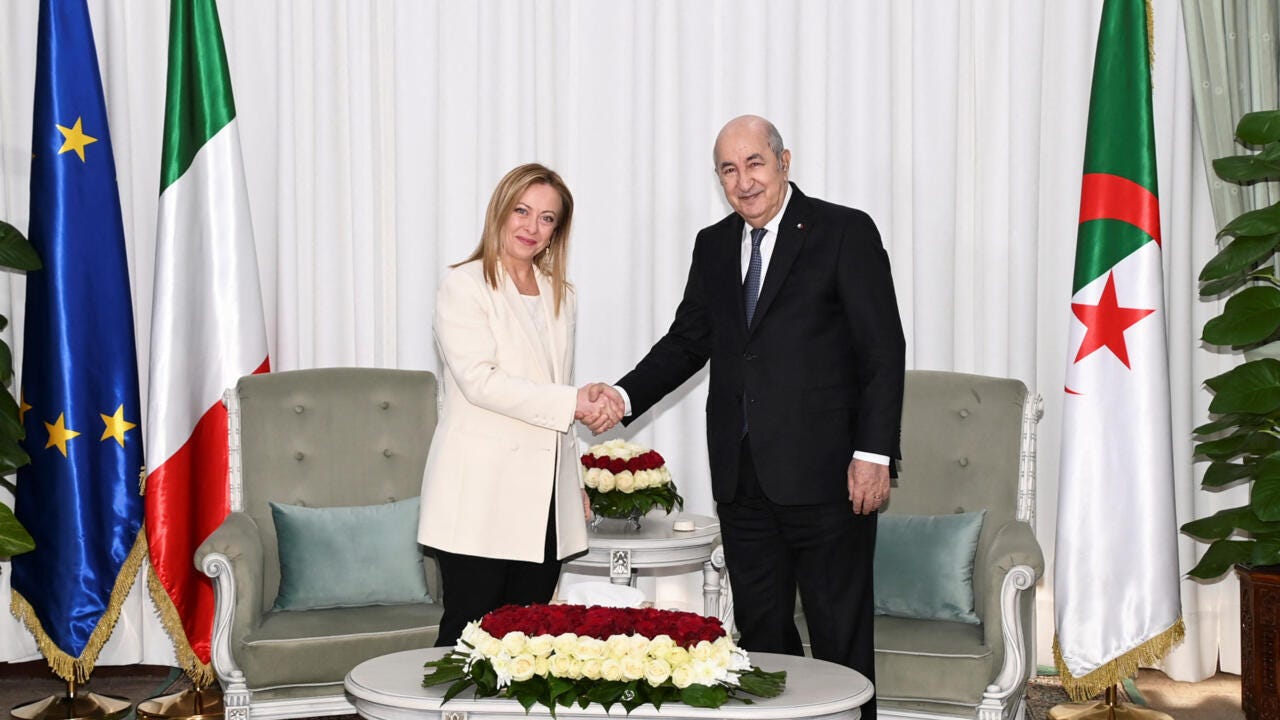Algeria-Italy Strengthen Bonds Past Oil
Algiers is boosting its energy hub status while pursuing economic diversification.
On 23 July, Algerian President Abdelmadjid Tebboune and Italian Prime Minister Giorgia Meloni oversaw the signing of seven bilateral agreements at “the 5th High-Level Algerian-Italian Government Summit” in Rome, reinforcing ties between the two nations. These include a $1.3 billion energy deal between Italy’s Eni and Algeria’s Sonatrach, a communications partnership between Algerie Telecom and Sparkle to build a new subsea cable, and discussions of a $1 billion steel investment for environmentally friendly steel production with low carbon emissions. These accords bolster a trade relationship valued at $16.4 billion, with Algeria as Italy’s primary African trading partner. This intensification aligns with Algiers’ liberalisation efforts and North Africa’s hydrocarbon resurgence.
Strategic Energy, Broader Goals
Algeria’s role as a hydrocarbon supplier underpins the deepened partnership with Italy, Europe’s second-largest gas market. With the world’s tenth-largest natural gas reserves and ranking as the sixth-largest gas exporter, Algeria is critical for Europe’s energy diversification, especially post-2022 following Russia’s invasion of Ukraine.
This energy-centered trade relationship heavily favors Algeria, with natural gas making up nearly 80% of its exports to Italy. While Italy exports primarily machinery, vehicles, and industrial goods to Algeria, the trade balance remains significantly tilted in Algeria’s favor, by over $3.1 billion in early 2025 alone. The $1.3 billion Eni-Sonatrach deal enhances gas production, leveraging Algeria’s proximity and infrastructure like the Transmed pipeline. High global energy prices have strengthened Algeria’s fiscal position, with hydrocarbons accounting for 90% of exports and 60% of government revenue. However, this dependency highlights the urgency of economic diversification to mitigate long-term vulnerabilities in a decarbonising world.
Nevertheless, despite the favourable energy ties Algiers enjoys with Italy, there is a clear push to diversify the state’s revenue sources. Previous advancements, such as the liberalisation of foreign investment in the mining sector, reflect an enthusiastic era of economic opening and a renewed focus on non-oil industries. In this context, the $1 billion steel investment involving partners such as CEIP Scarl and Copresud represents a pivotal step in Algeria’s diversification strategy. The steel sector, historically underdeveloped, is emerging as a key non-hydrocarbon export, contributing to a tripling of such exports to $5.1 billion in 2023. This industry is vital for job creation, addressing Algeria’s 14.9% unemployment rate in 2022, particularly among youth. By focusing on low-carbon steel, Algeria aligns with global decarbonisation trends and the EU’s Carbon Border Adjustment Mechanism (CBAM), enhancing competitiveness. Yet, bureaucratic inefficiencies and a state-dominated banking sector pose challenges to scaling this sector effectively.
In addition to energy and steel, the recent summit yielded agreements in communications and other sectors. A notable deal between Algerie Telecom and Italy’s Sparkle will develop a new subsea cable, enhancing Algeria’s digital connectivity and supporting its nascent tech sector. These initiatives, alongside discussions on infrastructure and trade facilitation, reflect Algeria’s push to diversify beyond hydrocarbons, fostering job creation and aligning with Italy’s interest in strengthening Mediterranean economic ties.
North Africa’s Hydrocarbon Resurgence
North Africa’s hydrocarbon resurgence has bolstered the Algerian economy, with GDP growth reaching 4.1% in 2023. This revival strengthens Algeria’s role as a regional energy hub but risks entrenching reliance on volatile commodity markets. Algeria’s liberalisation efforts, including the 2021 Investment Law and the Algerian Port Community System, aim to attract foreign direct investment and streamline trade.
However, overregulation and cronyism hinder private sector growth, limiting diversification. The Italy-Algeria partnership, through energy, communications, and steel initiatives, positions Algeria to balance hydrocarbon revenues with industrial growth, cementing its role in the Mediterranean’s evolving economic landscape.



